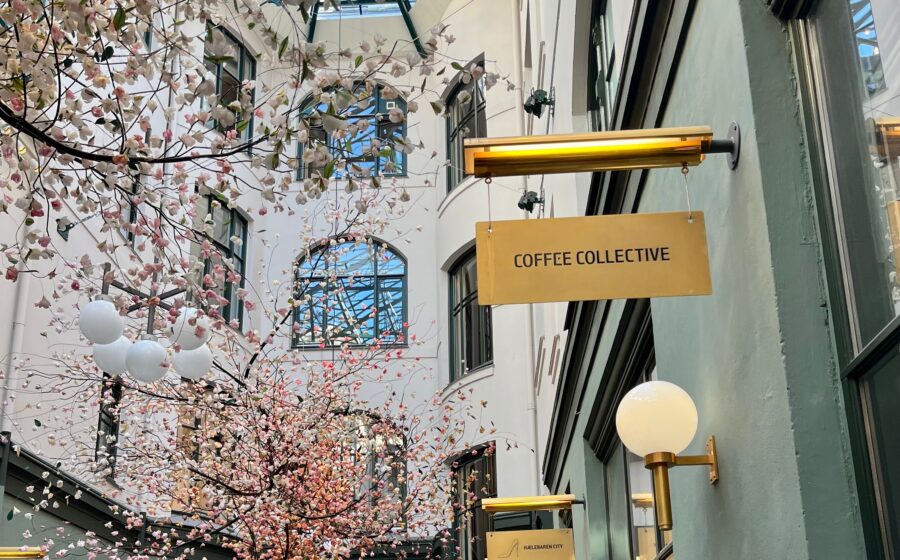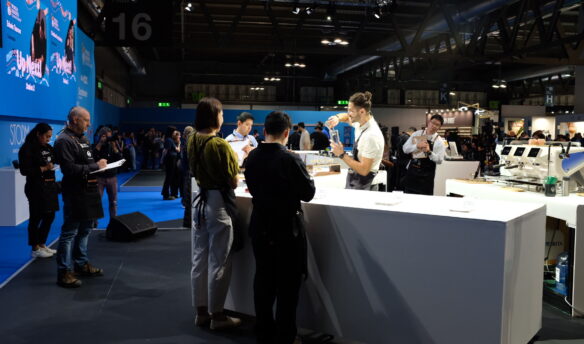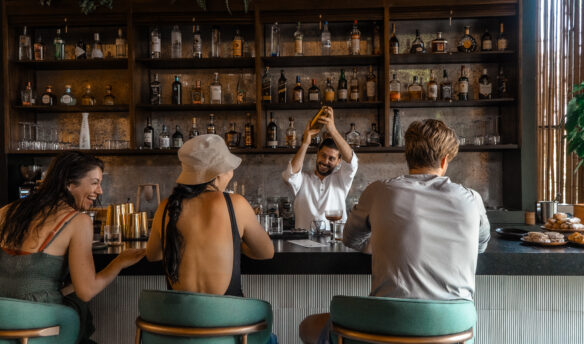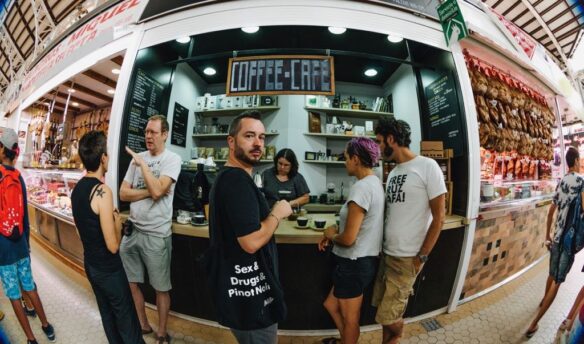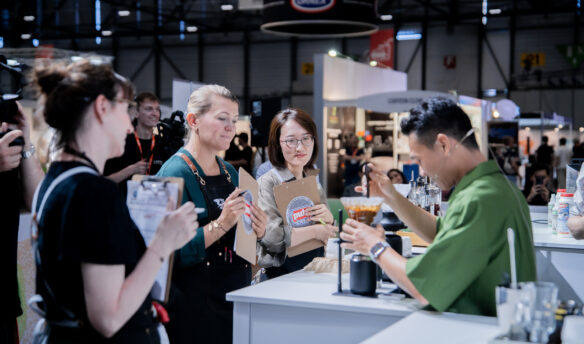Despite being a nation of just under six million people, Denmark consistently charts in the top five coffee-consuming countries globally—the average person drinks 19 pounds of coffee each year, or roughly 430 cups annually. Today, maybe one of those cups comes from roasters like Coffee Collective or La Cabra, two out of dozens of well-known coffee brands in the international specialty sphere, but specialty coffee wasn’t part of Denmark’s lauded culinary scene until recently.
Coffee has been part of Danish culture for decades, driven by large coffee brands like Merrild and Peter Larsen Kaffe, which have long provided the foundation for the “coffee and cake” breaks that are such a big part of Danish work life—no celebration is complete without a thermos of coffee and pastries. Specialty coffee only entered Denmark’s national consciousness in the mid-aughts.
“At the time [I won the World Barista Championship in 2006], there were a few coffee shops around [in Copenhagen], but we thought it was underdeveloped compared to what we knew coffee could be,” says Klaus Thomsen, one of Coffee Collective’s three co-founders. “We could see there was a big gaping hole in the market for the qualities of coffees that excited us.”
The coffee scene in Denmark has flourished rapidly over the last two decades. People like Thomsen—and many others—have helped propel the nation’s drive for better coffee by establishing a distinctly Danish coffee identity, one that prioritizes collaboration (including between competitors) and celebrates local traditions. Now, the Nordic nation sits as one of the most well-known specialty coffee destinations in the world, a distinction built through embracing what makes the country unique.
Origin Stories
“Since we started early in 2014, so many new roasters are popping up, especially in Copenhagen,” says Sine Klejs Gren, founder of Holy Bean Coffee Roasters, located in Aarup, a small town on the island of Fyn. We’re chatting on a bench outside of Café Sølle in Odense, Fyn’s largest city, on one of Denmark’s rare sunny days.
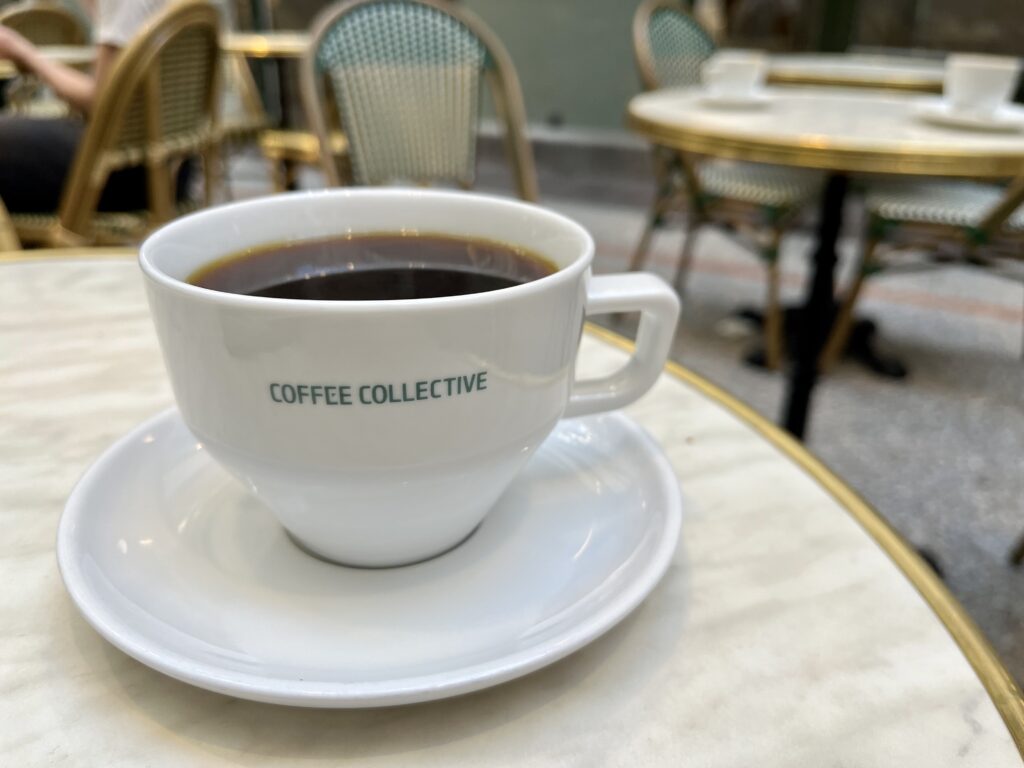
“We are actually the only one, if we can say so, focusing on specialty light roasts here on Fyn. There are other roasteries, but they focus on a darker roast for automatic espresso machines in offices,” says Gren. “We are going for small cafés, like Café Sølle, because they want to do something different.” Gren shares that Holy Bean provides wholesale services and coffee courses for businesses “that care about the values behind the coffee,” including a Michelin-star restaurant.
It would be hard to imagine a roastery like Holy Bean, with a focus on light roasted coffees, operating in a town with just over 3,000 people, opening even just a few decades ago. When Thomsen got involved in the specialty coffee scene around 2003, “the Danish specialty scene was very, very small, almost non-existent. There were two Danish World Barista Champions at that time, but they were using [coffee roasted in Italy],” he says with a laugh in an interview over Zoom.
“We started our roastery first in a little warehouse near the [Copenhagen] airport and just did wholesale and a webshop for half a year. And then we finally managed to open our own coffee shop, which was always the dream, in February 2008,” Thomsen says. That café would ultimately be the first of nine around the capital city, including a coffee bar inside a refurbished telephone booth and a bakery that supplies all other locations. Today, Coffee Collective is a certified B Corp that released its sixth annual transparency report earlier this year, outlining the company’s sourcing and purchasing goals.
Andreas Astrup, CEO and founder of ROAST Coffee, came to coffee from the nonprofit sector. “I had a dream about setting up a roastery in a producing country, maybe in Kenya. But then I got offered a job in Bangkok. Whenever I had a weekend off, I’d go up north in Thailand or to Laos and Indonesia and bring back green beans to roast on my balcony,” he says over Zoom. When Astrup returned to Copenhagen, he had a now-or-never moment and opened his roastery in 2015 in the neighborhood of Islands Brygge. Today, the roastery sits right around the corner from the original location.
At the time [I won the World Barista Championship in 2006], there were a few coffee shops around, but we thought it was underdeveloped compared to what we knew coffee could be. We could see there was a big gaping hole in the market for the qualities of coffees that excited us. Klaus Thomsen, Coffee Collective
His original business plan was to have one space that doubled as a roastery and cafe to serve as a showroom for the coffee but to focus primarily on online sales and subscriptions. After taking a roasting course with instructor Willem Boot, Astrup changed course. “I very much learned by doing,” he says. “The first year, I was both roasting and looking after the bar at the same time. It wasn’t a great way to do it, but it was just a lot of fun.” Now, there are three ROAST locations around Copenhagen, and Astrup is working on a new project called the “50-50” label that aims to guarantee coffee producers 50% of the retail price of a bag of coffee.
ROAST is one of a growing handful of roasteries attempting to shift the focus to sustainable coffee sourcing practices. “Coming from the nonprofit sector, one of the things I didn’t want to do with ROAST was start a new kind of feel-good charity,” Astrup says. “I wanted to do something sustainable, a more equal relationship, something that could grow and actually change things.”
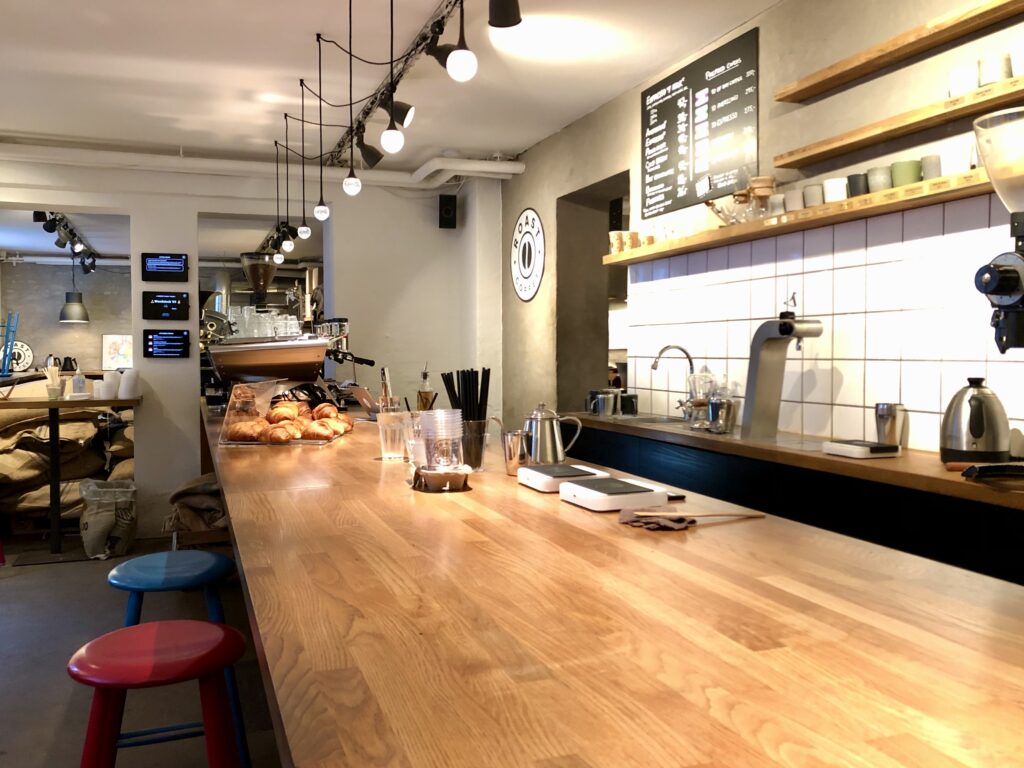
The “50-50” program accounts for 2% of ROAST’s coffee as of August 2023, and six of the 16 coffees on its web shop currently bear the label—but Astrup’s goal is to purchase more coffees with this model. “I think the market needs to change, but I’m optimistic. The customers need to be aware they need to pay a higher price, especially in exchange for better quality,” Astrup says. “It’s definitely still a work in progress. But it’s very close to my heart.”
A Growing Danish Coffee Scene
When I first moved to Denmark in 2020, I was thrilled to find that filter coffee was as ubiquitous here as in New York, where I grew up. Filter is also called almindelig kaffe (“ordinary coffee”), a phrase that a Merrild blog notes “is often connected with an old thermos and a boring taste” (Danish-to-English translation mine).
Almindelig kaffe usually refers to conventional, non-specialty coffee, which is what most Danes are used to drinking. Specialty coffee is, however, increasingly on the menu—and Thomsen thinks the proof is in the cup. “We’ve always resented when [people] say consumers can’t taste the difference,” he says. “And we’ve always been like, that’s bullshit. […] As baristas, we knew people could taste the difference even in a single latte. They would come in and say, ‘It’s funny how your latte tastes different than the guy down the street.’ Like, ‘His is much more smoky,’ or ‘Yours is more caramelly.’ People are way smarter than they’re given credit for.”
Coming from the nonprofit sector, one of the things I didn’t want to do with ROAST was start a new kind of feel-good charity. I wanted to do something sustainable, a more equal relationship, something that could grow and actually change things. Andreas Astrup, ROAST COFFEE
One of Holy Bean’s strategies to carve out a niche for specialty coffee among more conventional consumers has been to partner with wine and boutique shops, where Danes might look for a nice gift when attending a dinner or housewarming party. In a bundle of Holy Bean coffees I once received as a Christmas present, there were three blends named after Hans Christian Andersen fairytales: “Nattergalen” (The Nightingale), “Tinsoldaten” (The Steadfast Tin Soldier), and “Tommelise” (Thumbelina). Gren and her collaborators thought it was a natural choice for the Danish market. “Everybody knows HC Andersen,” she says of the writer, who was born in Odense.
Although Holy Bean focuses on light-roasted coffees now, Gren says that during the early days, she struggled to build a coffee menu that she was excited about that also met consumers’ expectations. “In the beginning, I hated that everybody wanted the same thing. They wanted full-body chocolatey and nutty, and to put milk in their espresso. And I wanted to sell very light-roasted coffee and present those unique floral and citrus flavors.”
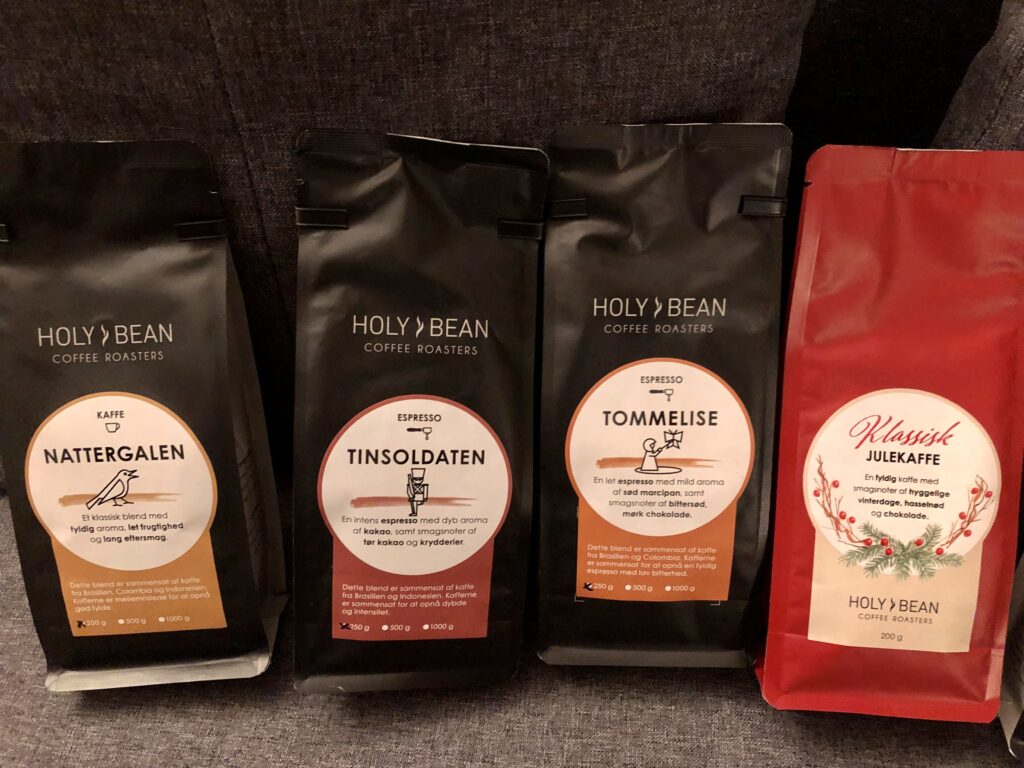
Eventually, Gren learned to find the balance. “At one point, we said, ‘Okay, what if we do a medium roast? It is still quite a balanced cup of coffee.’ As the years went by, I understood why it is so important to have coffee that everybody likes. [It’s allowed us to] grow a healthy business slowly and steadily.”
Offering more roast profiles can also bring a wider range of consumers to the specialty table. ROAST offers their full range of light, medium, and dark specialty roasts on pour over from origins like Burundi, Yemen, and Papua New Guinea. Their packaging bears a country abbreviation and a number; for example, KEN12, which looks like a colorful chemical symbol and designates ROAST’s twelfth offering from Kenya.
Astrup says ROAST’s bag design and naming conventions help customers identify if the bag of coffee they’re purchasing comes from a lot or region they’ve purchased before, showcasing just how far consumers have come in the last few decades. “There’s more focus on good quality coffee than there used to be, and people know much more about coffee than they used to,” he says.
From Local Relationships to Global Recognition
Although Coffee Collective only has cafes in Copenhagen, their coffee can be found in 20 countries across Europe, Asia, and North America. “In our first years [of operation], we felt that we were more known internationally than we were locally,” Thomsen says.
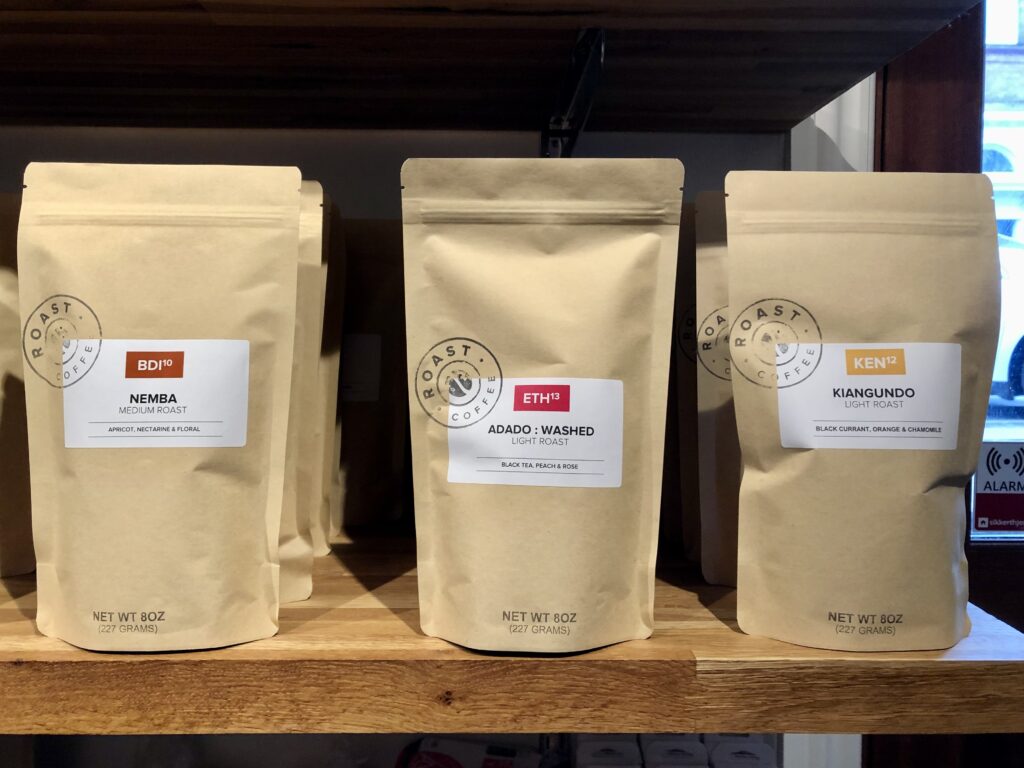
“It was a consequence of [the fact] that I had won the World Brewing Championship and my business partner Casper [Engel Rasmussen] won the World Cup Tasting Championship the year after we started, while our third business partner Peter [N. Dupont] has big recognition [among people who source coffee]. So whenever we had people traveling abroad, they would come back and say, ‘How the hell did your coffee make it to a shop in Seattle?’”
Danish coffee brands have an increasing presence on the world stage. In addition to large international chains like Ole & Steen and Joe & The Juice (both founded in Copenhagen), specialty coffee roaster La Cabra (based in Aarhus, Denmark) opened its flagship New York store in 2021, and April Coffee Roasters (founded in Copenhagen) expanded to Seoul in 2022.
Thomsen says that World of Coffee, an international coffee trade show coming to Copenhagen in 2024, shows how much the specialty coffee industry has grown in the capital city. He attributes that growth to the collaborative spirit and mutual trust that characterizes much of Danish business culture. “I think there are very few cities worldwide that have as much good coffee as Copenhagen does right now. […] When [our industry colleagues] do something awesome, we feel like, ‘Oh man, that was cool, but ah, we can do something even better.’”
A nearby roastery had a fire some years ago. And I said, ‘Of course you can come and roast in our roastery,’ because I hope they will do the same one day if I [have a crisis]. I totally understand that some things [like roasting profiles] are a secret in this business. But overall, I would say that we are quite close. Sine Klejs Gren, holy bean coffee roasters
“I think all the new coffee shops and roasters that opened up are not competitors in many ways. It’s more colleagues, where we all know each other and go to each other’s shops and try each other’s coffee and talk about it,” says Astrup. “I believe we opened up the market for each other.”
Camaraderie and mutual respect seem to be the fuel that propels the Danish coffee scene forward, and people readily help one another when they can. Gren, who is currently pregnant with her third child, says another coffee colleague agreed to help her move and lift heavy things around the roastery when she was pregnant with her second—and this support goes both ways. “A nearby roastery had a fire some years ago,” Gren says. “And I said, ‘Of course you can come and roast in our roastery,’ because I hope they will do the same one day if I [have a crisis]. I totally understand that some things [like roasting profiles] are a secret in this business. But overall, I would say that we are quite close.”
“It’s like a friendly competition to improve us all,” says Thomsen. “And I think we all grow together.”
Photos by Chloé Skye Weiser



